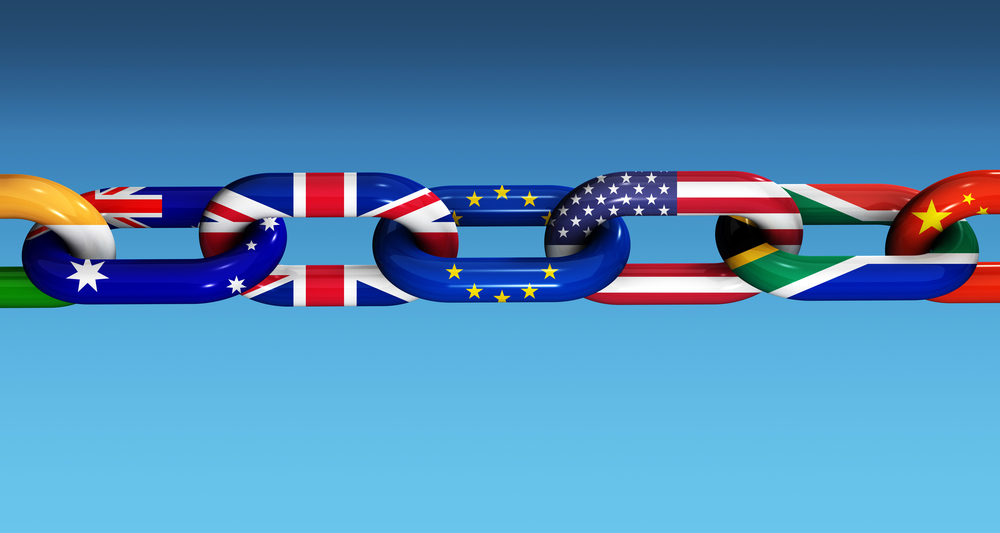There’s no rule that says you need to only look in your home environment when it comes to deciding where you should be setting up your business. In this ever-globalized world, it’s more than possible to look to foreign lands as the place to set up your new venture. While things can be slightly trickier than doing it in your home country, if you take on the challenge then you might just find that the excitement and potential rewards more than makeup for the extra effort that’s involved. Indeed, set up your business now, and you might just find that you’re ahead of the curve, especially as it looks like the world is going to become even “smaller” in the coming decades.

Shutterstock Licensed Photo – By chombosan
Choosing the Right Destination
Once you’ve decided not to set up your company in your home country, then the only limits are those of your imagination. Of course, it’s not just a matter of throwing a dartboard at a world map, and then choosing to go there. While they’ll be no shortage of places in which you can conduct your business, not all countries will be created equal. You’ll be well served by picking a place with which you already have some passing familiarity, and which you know presents itself with a good overall economic climate in which to set up a business.
Consider a Partner
While you could do everything by yourself, you’ll likely find things much easier if you have a partner on board with you. This is because you’ll be relatively “alone” in your new country, which is a situation you would be unlikely to experience at home. While many people think of entrepreneurs as solo geniuses creating their empire, the truth is that they usually have the help of many people and organizations on their way to success. There is an art to finding a business partner that’ll help more than they’ll hinder, so make sure you don’t rush into the decision. You’re in it for the long haul, so you need to be able to work with them during the good times and the bad if the partnership is going to work.
Learning the Language
If you’re going to a place that speaks a language other than your own, then you’ll want to learn the language, especially if there isn’t a common “global” language, such as English, being spoken there. You don’t need to be fluent, but you should be able to communicate competently. The good news is that you can learn a language relatively quickly, more quickly than you might imagine, if you’re ready to put in the effort. When it comes to important business meetings, you’ll want to get a translator in to make sure everything is fully understood, though.
Cultural Differences
There are many traits that can be considered universal, aspects of the human condition that cross all ages and borders, but one of the wonders of life is just how different people can elect to live their lives. Before getting too deep into your business plan, you’ll need to be aware of any prominent cultural differences that you may experience. This will help you to target your business more efficiently, and, perhaps more importantly, prevent you from inadvertently insulting potential business partners and the general public. Something that you find completely innocent might, in fact, be deeply offensive to someone. In understanding the cultural differences, you’ll be able to prevent these occurrences.
Conducting Your Research

Shutterstock Licensed Photo – By Rawpixel.com
It’s vitally important that you’re conducting your market research before you set up a business, wherever you are. But when you’re abroad? Then it becomes even more important, and especially so if you’re taking a product or service from, say, the United States, to a new country. During your research, you might find that similar businesses are already offering what you were planning to offer, or that the public has no need for what you offer. In any case, it’ll help you to focus your efforts more clearly, and will direct you where you need to go.
Also Read
Exchange Rate Issues
It takes a lot of money to set up a business, but you might end up spending more money than necessary, and all because of one annoying issue: exchange rates. These can fluctuate all the time, so when you’re doing your research, take a look at how the rates have changed in the past year or so. If it was much better six months ago, then you might want to consider delaying your launch until things have picked up again. Also, keep in mind that there may be costs attached to transferring money from your bank in your home country to abroad, too.
Relocating
You won’t just be setting up a business to a new country; you’ll be relocating there. Moving to a new country is no small matter, and it’ll be difficult to juggle settling in and setting up a business both at the same time. As such, it’ll be much better if you give yourself time to settle into your new surroundings before throwing yourself into all the tasks that setting up a new company involves. Find a property to rent or buy from a website like Rumah, move your belongings, and spend some time to adjust to your new home. Once you feel at home, you’ll be able to dive deep into your professional ambitions knowing your personal circumstances have been well taken care of.
Live Like the Locals
You won’t just be living in your chosen destination; you’ll be contributing to its culture, in some small way. The best way to contribute in ways that are in keeping with local customs is to, well, understand what the local customs are. Speak to the locals, and throw yourself into the life of your new home. It’ll help you feel more settled, and also teach you a lot about the correct way to go about introducing your business to the city.
Get the Inside Scoop
As much as you can try to understand a place, sometimes it’ll take years – if not decades – of living there before you really understand the place. As such, it’s a good idea to work with someone with local knowledge, a person who has lived there all their life and understands the business climate. They’ll make it much easier to get the right paperwork, work with other businesses, and understand when will be the best time to launch your business, among other things.
Check the Laws
In some places, all you need is some cash and to fill out some paperwork, and you’re on your way to opening a business. In other places, the process can be so long and daunting that you seriously consider whether the whole thing is worth it. Before going too deep into the project, check what laws you’ll need to abide by, and especially those that are specific to non-natives.
Finding the Staff
You’re going to need staff to work for your business, even if it only begins as a small operation. But of course, anybody who has tried to hire before knows how difficult it can be. Needless to say, this becomes even more complicated when your overseas, where standards, conduct, and qualifications are likely to be different than at home. Instead of going through a costly trial and error process, it’s best to work with a professional staffing agency. If you choose one that has a good reputation, then you won’t need to worry whether you’re getting good staff or not: everyone they send to you will top quality. In time, when you understand more, you’ll be able to make your own calls when it comes to your staff.
Understand the Political Climate

Shutterstock Licensed Photo – By niroworld
There are a few things in business that are completely beyond your control, but which can have a significant impact on your business success. This can include the weather, for example; an area prone to extreme weather might mean your business is finished before it gets underway. Or take the political climate. When you’re researching which countries might be a good option for your business, make sure you’re looking beyond the local life, culture, and economy and also spend some time getting to understand the political climate. You’ll want to sure it’s stable and robust before investing your time, energy, and money into the project.
Take Your Time
Nothing that is worth having comes fast, as most people in the business world understand. This is even more important when setting up a business overseas. Because you’ll need to conduct more research overseas then you would at home, you’ll need to think of your ambition as a long-term goal, not something that will come quickly or within a matter of months. So be patient! It’s better to spend a little bit more time making sure everything is right rather than launching and realizing that there’s still much that you don’t know.
An overseas company isn’t easy, but it can be worth it – and a profitable, great adventure, too.
